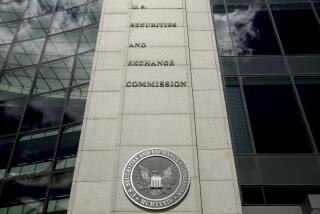10 Soybean Traders Convicted of Fraud in Sting : Futures: Eight of the group also are guilty of racketeering. Prosecutors call them thieves who made up their own rules at Chicago Board of Trade.
- Share via
CHICAGO — Ten soybean traders were convicted Wednesday of charges ranging from fraud to racketeering in a case stemming from the government’s undercover probe of cheating on the world’s largest futures exchanges.
The 10, who will be sentenced later and could appeal the verdicts, were described by government prosecutors during the trial as an arrogant band of thieves who routinely made up their own rules to defraud customers at the Chicago Board of Trade.
After a 13-week trial, eight of the 10 men were found guilty of racketeering and all were convicted of mail and wire fraud. The jury had deliberated since Dec. 10.
“The jury’s verdict speaks loudly and clearly . . . . This should restore the confidence of people in these markets,” U.S. Atty. Fred Foreman said after the verdict.
Defense lawyers had argued that some of the practices were caused by the crush of business and that the traders had their customers’ best interests in mind.
Prosecutors said some of the traders acted as “bagmen”--taking kickbacks in exchange for accepting mismatched trades--or had cheated customers in other ways.
The trial was the third resulting from an FBI undercover investigation of cheating at the Board of Trade and the Chicago Mercantile Exchange.
The 2 1/2-year investigation, in which agents posing as traders infiltrated the hectic floors of the world’s two largest exchanges, resulted in the indictment of 48 people on fraud, racketeering and other charges.
The guilty traders face the possibility of long prison terms and heavy fines, along with forfeiture of their valuable exchange memberships and trading profits.
Board of Trade Chairman William O’Connor said traders found guilty would be suspended or expelled from the exchange.
But he said: “While any indictment or conviction is one too many for us, everyone should understand that the number of members indicted was less than two-thirds of 1% of our membership.”
Prosecutors noted that the names of several traders were mentioned during the trial as being part of the scheme and that those traders could end up facing charges.
“Our intention is to pursue this investigation further,” Foreman said.
In Washington, Atty. Gen. Dick Thornburgh hailed the convictions, saying in a statement: “Today’s verdict clearly demonstrates that skimming the profits from the customers of commodities and futures exchanges will not be tolerated.”
An earlier trial involving three traders of Swiss francs ended with a split verdict on some charges and the jury deadlocked on others. The government has indicated that it may seek another trial in that case.
Twelve traders of Japanese yen from the Mercantile Exchange have been on trial since Sept. 5 on similar charges.
Futures markets operate in fast-moving trading pits where dealers trade the obligation to buy or sell a commodity at a set time in the future. The contracts help reduce risk for those who need to buy such products in the future, since they can lock in their prices.
Although big grain companies and food processors actually take delivery of the corn, soybeans, wheat or other commodities, most traders do not intend to do so, making their money by moves in the market--buying a contract at a low price and selling it at a higher price, for example.
In the wake of the probe, both exchanges have implemented rule changes they say have lessened the chances of wrongdoing.
Several traders who attended the trial voiced remorse over the fate of their colleagues.
“It’s a big shame,” Jack Scoville said. “I knew and traded soybeans with some of those guys on the floor, and I thought they were honest traders.”
More to Read
Inside the business of entertainment
The Wide Shot brings you news, analysis and insights on everything from streaming wars to production — and what it all means for the future.
You may occasionally receive promotional content from the Los Angeles Times.










